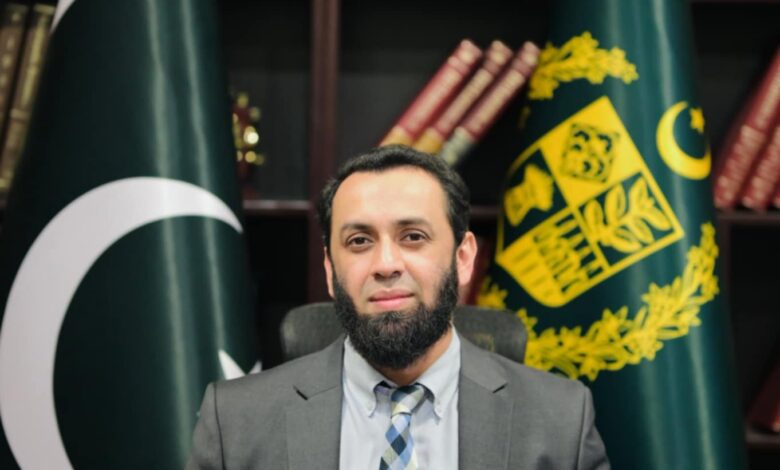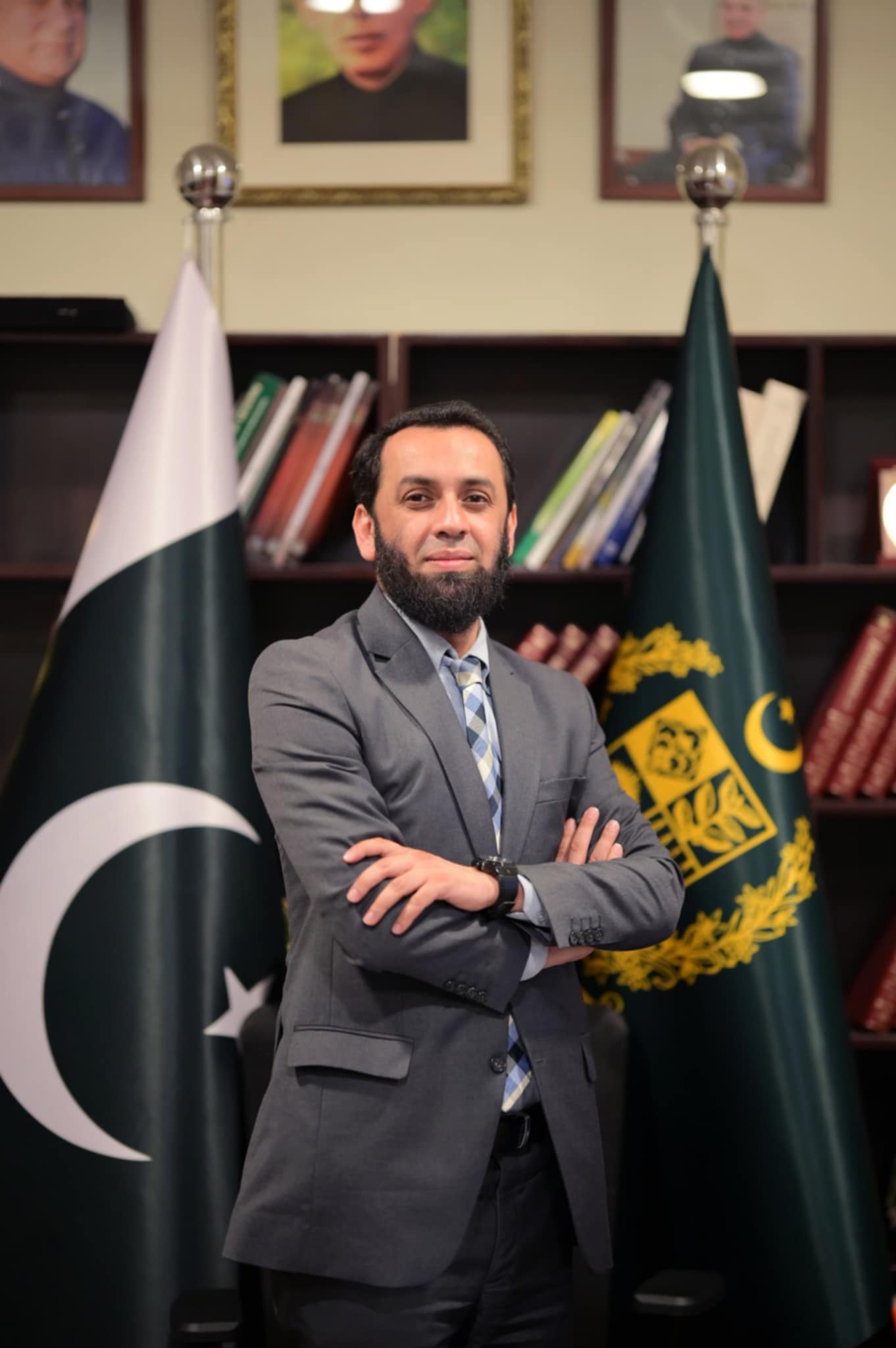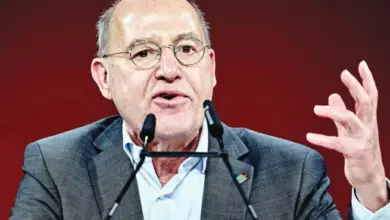
In this exclusive interview with Al-Masry Al-Youm, Pakistani Information Minister Attaullah Tarar said that the US, under the leadership of its current President Donald Trump, helped prevent a catastrophe between two nuclear-armed neighbors, Pakistan and India.
He assured that Pakistan exercised its right to self-defense against India, and will respond in anyway necessary if India ever violates its bounds – including nuclear warfare.
The minister noted that the root of the conflict between the two nations lies in Kashmir, and he specifically held the UN as accountable for the continuation of this conflict, ongoing since 1947.
He emphasized that the ceasefire and the truce will remain in place, and added that India used Israeli-made drones while contacting Washington to reach a ceasefire.
Pakistan, through its Prime Minister Muhammad Shehbaz Sharif, declared victory in the war, relying on its armed forces and the support of its people, Tarar added.
Interview
■What is the current situation between Pakistan and India after the US announced a ceasefire, given the ongoing media war between the two countries?
– US President Donald Trump played a pivotal role in mediating a ceasefire between Pakistan and India when hostilities reached their peak and disaster loomed.
He successfully prevented a catastrophe between two nuclear-armed neighbors.
With Trump announcing his desire to help resolve the Kashmir dispute – the root of the conflict between Islamabad and New Delhi – through bilateral dialogue, our country considers the US’s position as “constructive,” while also appreciating the contributions made by other friendly countries.
■ Was the recent tension a reaction to the Pahalgam incident?
– Yes, India has blamed Pakistan for everything that happens on the border, such as the Pulwama incident in 2019. It also engineered similar drama in Pahalgam in a desperate attempt to divert attention from its own internal failures.
India targeted civilians in its airstrikes, and the next day, Pakistani defense forces shot down several Indian drones, which were found to be Israeli-made.
The next night, India attempted to attack Pakistani defense installations.
After these provocations, Pakistan responded with full might. Within a few hours, India contacted the US, calling for a ceasefire.
The truce still holds to this day.
Let me remind the world public opinion that, following the Pahalgam incident in Kashmir, India announced the incident within 10 minutes and quickly went to accuse it of being financed from outside the borders. Although Pakistan announced a call for a fair and transparent investigation into the incident, India did not heed our call and immediately launched military operations.
Therefore, Pakistan responded swiftly. We have always emphasized that Pakistan, as a major country, fights terrorism and is committed to regional and global peace.
India must stop its human rights violations in occupied Kashmir and refrain from blaming neighboring countries.
■Let me relay to you India’s accusations that Pakistan supports what New Delhi describes as “terrorism” in order to destabilize its neighbor.
– These accusations are persistent – India always blames Pakistan, but has never provided any evidence.
On the contrary, India has been caught red-handed. Kulbhushan Jadhav is a prominent example of India’s involvement in terrorist activities in Pakistan.
Recently, when terrorists attacked the Jaffar Express train, Indian media broadcast the footage before Pakistani news channels. Some Indians even celebrated the incident.
But we have evidence that India is the one supporting terrorism in Balochistan and Khyber Pakhtunkhwa.
India’s accusations are “false propaganda” aimed at tarnishing the image of Islamabad, which has made strenuous efforts to combat terrorism and has continuously been its victim. I challenge you to find a country like Pakistan that has lost over 90,000 people due to abhorrent terrorists.
Therefore, when New Delhi claims that Islamabad supports terrorism, this is the most eloquent response to its lies.
Let’s not forget that the Pakistani Armed Forces have made tremendous sacrifices, as they constitute a strong shield against terrorism.
Our country is the barrier between terrorists and the world, and therefore we need support to continue the fight against terrorists trying to impose their ideology.
■Is the conflict due to mutual accusations of supporting terrorism, or is it related to the Kashmir issue?
-The root cause of the Pakistan-India conflict is certainly the unresolved issue of Jammu and Kashmir.
If this dispute is resolved in accordance with the aspirations of the Kashmiri people, Pakistan and India can live peacefully as neighbors.
There are other secondary issues, but they can be resolved amicably if the main obstacle, namely if the Kashmir issue, is addressed.
Kashmir was supposed to become a natural part of Pakistan, but India illegally occupied it, leading to a Kashmiri revolt.
This is open to interpretation. In my view, it is about the fundamental right of self-determination of the Kashmiri people as stipulated in the partition plan.
■You claim to be the owners of Kashmir, yet India says this region belongs to it?
-Kashmir is the unfinished agenda for the partition of the Indian subcontinent.
According to the principles of the international partition plan, Kashmir, a Muslim-majority region bordering Pakistan, should have joined Islamabad.
However, India, in violation of international law and morality, deployed its forces and illegally occupied it.
When India brought the issue to the UN Security Council, it granted Kashmiris the right to self-determination through a free and fair referendum under UN supervision.
Elections cannot replace a referendum.
■ You are talking about a referendum on Kashmir’s independence or joining Pakistan, but India rejects this. So what is the solution?
-Pakistan believes that Kashmir is a disputed territory recognized by the UN, and that India has no right to rule it by force. Therefore, the Kashmiris must be given the right to self-determination to choose to join Pakistan or India.
Pakistan desires a peaceful resolution to all disputes, but this should not be seen as weakness.
Therefore, Pakistan has responded firmly to India’s recent escapades and will continue to do so in the face of any aggression.
■If India persists in its rejection of the referendum, would it be better to deploy Asian or UN forces to prevent a mutual war between the two nuclear powers?
-When India turned to the United Nations in 1947 to resolve the conflict, the UN Security Council issued several resolutions calling for a free and fair referendum and deployed observers along the ceasefire line, now known as the Line of Control.
I believe that the presence of the United Nations Military Observer Group in India and Pakistan (UNMOGIP) could be expanded to monitor the situation more effectively.
■ You talk about deploying UN forces, but over the past years, has the UN played a role in calming tensions with India?
– The UN bears a significant responsibility regarding the Kashmir hotspot.
If it were resolved, the people of the entire region would breathe a sigh of relief, and the billions of rupees spent on arms could be repurposed for development in both countries.
■ Some say that what the people of Kashmir are experiencing is similar to what is happening in occupied Palestine. Is this true?
– This is true. Over the course of nearly 78 years of India’s occupation of Kashmir, violations against the people of the region have continued, including acts of violence, oppression, and murder. This is similar to what Palestine is experiencing.
Therefore, out of our feelings toward what Kashmir is experiencing, we support Palestine’s just cause that requires the establishment of an independent and viable state on the pre-1967 borders, with Jerusalem as its capital.
Israel, like India, is committing war crimes and violating all international laws.
Based on our role, Pakistan remains steadfast in its support for the oppressed Palestinian people, and will continue to raise its voice against injustice in international forums. Palestine is not just an international political issue – it is linked to the identity of Pakistan.
The Pakistani people are closely connected to this sacred cause, and we assure the world that Islamabad will never recognize Israel, as Pakistan’s founding leader, Muhammad Ali Jinnah, affirmed.
Our country fully appreciates the role played by Egypt in its strenuous efforts to halt the Israeli war on the Gaza Strip, as well as its fruitful cooperation in delivering thousands of tons of relief supplies to Gaza, through our embassy in Cairo.
■ During the One-Day War, there were threats to use nuclear weapons. Is that likely to happen?
– Personally, I feel that the recent confrontation, including airstrikes and drone attacks, was a full-scale war, short in duration but concentrated in intensity.
In my opinion, India would not dare to start a full-scale war with Pakistan.
However, the Pakistani Armed Forces are on high alert. In the event of such a war, the use of nuclear weapons cannot be ruled out.
■Yet the entire world followed the speech of the Pakistani army chief, who issued inflammatory statements that could further inflame the conflict?
– Pakistan did not escalate tensions – rather, India engaged in fueling the war by targeting civilians, and then military sites, with missiles and drones.
Pakistan exercised its right to self-defense under Article 51 of the UN Charter, and the results were clear.
Pakistani Prime Minister Shehbaz Sharif declared victory over India thanks to the efforts of the Pakistani Armed Forces and the support of the people, who supported his forces in defending Pakistani skies and land.
Indeed, God has bestowed victory upon us, so the government has called for a prayer of thanks, raising the national flags on homes, embassies and national institutions, and lighting candles to express solidarity with the Pakistani Armed Forces and honor the martyrs who sacrificed their lives in defense of the homeland, on May 16, in honor of the Pakistani people and the armed forces for the historic victory in the battle of truth.
A 31-gun salute was fired in the federal capital and a 21-gun salute was fired in each provincial capital to mark the occasion.
■ Do you think any tension could lead to a change in the Indian or Pakistani government?
I cannot comment on India, but in Pakistan, we have an elected government, with the current Prime Minister, Muhammad Shehbaz Sharif, and the government has fulfilled its economic and military obligations in defending its territory and defending its people, who have the full and comprehensive support of the government. All national institutions are united, and there is no concern about a change of government.
■ When do you expect to see a meeting between Shehbaz Sharif and Indian Prime Minister Narendra Modi?
– Pakistan has always sought to resolve all disputes with India, including the Kashmir issue, through dialogue with India, particularly the Modi government, but it has not responded positively to Islamabad’s overtures.
We are ready to hold talks, and now it is up to the Indian leadership to make its decision.
■ Has India really stopped the flow of rivers from its side toward Pakistan?
– So far, I don’t believe India has stopped the flow of rivers, but it has malicious intentions to divert their course in the future.
Any such action would be considered an act of war by Pakistan, which will not refrain from a strong, earth-shattering response to New Delhi if the situation escalates or India oversteps the bounds of reason in its dealings with Pakistan, which has already dealt a powerful deterrent blow.
■ It is well known that any tension or outbreak of war has economic repercussions, especially with the suspension of flights and trade. Have you noticed an impact?
– Pakistan’s economic situation is proceeding as usual. I don’t see any significant negative impact. In fact, the stock market saw a noticeable recovery after the ceasefire was announced. Pakistan adhered to it out of appreciation for Washington’s position calling for peace in the region and to avoid a major war.
Pakistan also believes in peaceful coexistence and welcomes mediation from any friendly country.
■ What is your comment on India’s demand that Pakistan’s nuclear weapons be kept under the supervision of the International Atomic Energy Agency?
This is totally condemned, and we call on the international community to investigate the repeated incidents of nuclear material theft and security breaches at Indian nuclear facilities.
Reports in 2024 of the theft of radioactive equipment from the Bhabha Atomic Research Center are cause for concern, particularly given the international safety concerns.
Furthermore, India’s statements regarding this issue represent a lack of understanding of the responsibilities set by the International Atomic Energy Agency.
Pakistan’s conventional capabilities are sufficient to deter Indian aggression.





